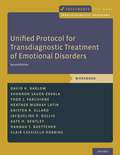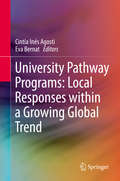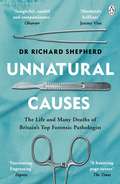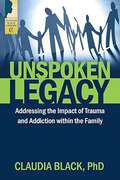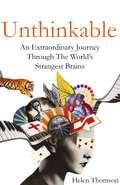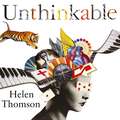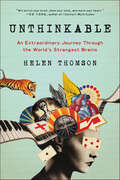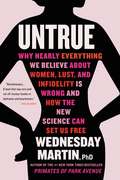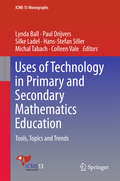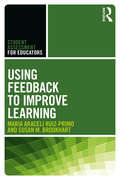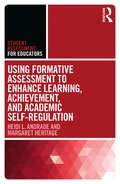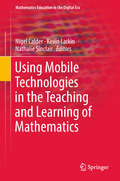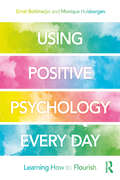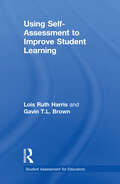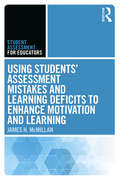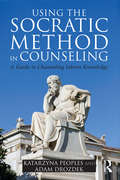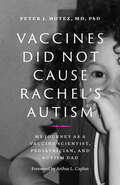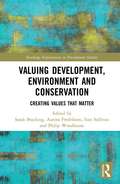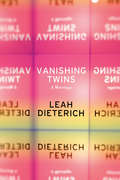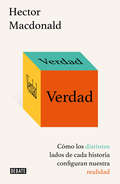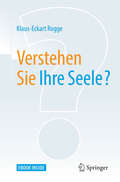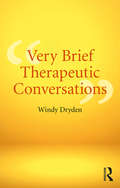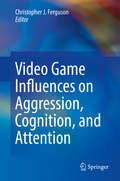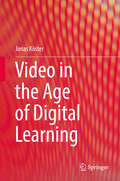- Table View
- List View
Unified Protocol for Transdiagnostic Treatment of Emotional Disorders: Workbook (Treatments That Work)
by David H. BarlowLeading therapists and researchers have come to understand that many psychological disorders share common features and respond to common therapeutic treatments. This deepened understanding of the nature of psychological disorders, their causes, and their symptoms has led to the development of new, comprehensive treatment programs that are effective for whole classes of disorders. Unified Protocol for Transdiagnostic Treatment of Emotional Disorders is one such program. <P><P>Designed for individuals suffering from emotional disorders, including panic disorder, social anxiety disorder, generalized anxiety disorder, posttraumatic stress disorder, obsessive compulsive disorder, and depression, this program focuses on helping you to better understand your emotions and identify what you're doing in your responses to them that may be making things worse. Throughout the course of treatment you will learn different strategies and techniques for managing your emotional experiences and the symptoms of your disorder. You will learn how to monitor your feelings, thoughts, and behaviors; confront uncomfortable emotions; and learn more effective ways of coping with your experiences. By proactively practicing the skills presented in this book-and completing the exercises, homework assignments and self-assessment quizzes provided in each chapter, you will address your problems in a comprehensive and effective way so you can regulate your emotional experiences and return to living a happy and functional life.
University Pathway Programs: Local Responses Within A Growing Global Trend
by Cintia Inés Agosti Eva BernatThis volume is the first to compile the insights of experienced and informed education researchers and practitioners involved in the delivery of university pathway programs. These programs have emerged as effective responses to global, national and local students’ needs when transitioning to Higher Education. The book opens with an overview of the main drivers for the development of university pathway programs, and a description of the main characteristics of such programs, as well as of the different types of programs available. It examines topics such as the way in which policy and governance issues at the institutional, state, and federal level affect university pathway programs’ financial models, compliance and quality assurance mechanisms as well as program provision. It also looks at how to address issues related to 'non-traditional' background students such as those from lower socioeconomic background, students for whom English is an additional language (EAL), indigenous students, mature age students and humanitarian entrants. The volume showcases thirteen university pathway programs offered in Australia, Canada, New Zealand, South Africa, Qatar, and the United Kingdom. These examples provide valuable insights that will help guide future practice in the field as the programs described effectively foster and support the development of students’ academic literacies, study skills and awareness of the socio-cultural norms that are necessary to participate successfully in higher education settings. In reporting the strategies to overcome challenges in the areas of curriculum development and implementation, of equity, inclusion and participation, of cross-sector collaboration and of student welfare, the volume promotes reflection on these issues and, therefore, better equips those education practitioners embarking on the university pathway program journey.
Unnatural Causes: 'An absolutely brilliant book. I really recommend it, I don't often say that' Jeremy Vine, BBC Radio 2
by Dr Richard ShepherdTHE TRUE CRIME BOOK OF THE YEAR AND 18-WEEK SUNDAY TIMES TOP 10 BESTSELLER'One of the most fascinating books I have read in a long time. Engrossing, a haunting page-turner. A book I could not put down' The Times, BOOKS OF THE YEAR__________Meet the forensic pathologist, Dr Richard Shepherd.He solves the mysteries of unexplained or sudden death.He has performed over 23,000 autopsies, including some of the most high-profile cases of recent times; the Hungerford Massacre, the Princess Diana inquiry, and 9/11. He has faced serial killers, natural disaster, 'perfect murders' and freak accidents.His evidence has put killers behind bars, freed the innocent, and turned open-and-shut cases on their heads. Yet all this has come at a huge personal cost. Unnatural Causes tells the story of not only the cases and bodies that have haunted him the most, but also how to live a life steeped in death. Thoughtful, revealing, chilling and always unputdownable, if you liked All That Remains, War Doctor and This is Going to Hurt you'll love this. **Pre-order Dr Richard Shepherd's new book THE SEVEN AGES OF DEATH now**__________'Gripping, grimly fascinating, and I suspect I'll read it at least twice' Evening Standard'A deeply mesmerising memoir of forensic pathology. Human and fascinating' Nigella Lawson 'An absolutely brilliant book. I really recommend it, I don't often say that but it's fascinating' Jeremy Vine, BBC Radio 2'Puts the reader at his elbow as he wields the scalpel' Guardian 'Fascinating, gruesome yet engrossing' Richard and Judy, Daily Express'Fascinating, insightful, candid, compassionate' Observer
Unspoken Legacy: Addressing the Impact of Trauma and Addiction within the Family
by Claudia BlackA far-ranging examination of how the effects of addiction and trauma in the family can reverberate for generations <P><P> Trauma and addictive disorders are often a result of psychological injuries experienced as a child. These injuries typically produce long-term and harmful generational consequences on loved ones and other family members. Claudia Black presents a searing portrait of a broken family system, exploring how addiction and trauma develop and how their damaging repetition uproots and frequently destroys one's family tree. Filled with vignettes highlighting the various causes of trauma, Dr. Black helps readers understand its physiology and psychology and gives them healing, proactive steps to build healthier relationships. <P><P> Claudia Black, PhD, is internationally recognized for her pioneering and cutting-edge work with family systems and addictive disorders. Her work with children affected by drug and alcohol addiction in the late 1970s fueled the advancement of the codependency and developmental trauma fields. Dr. Black's passion to help young adults overcome obstacles and strengthen families built the foundation of the Claudia Black Young Adult Center at The Meadows. Not only is Dr. Black the clinical architect of this innovative treatment program, she is also actively involved with the treatment team, patients, and their families.
Unthinkable: An Extraordinary Journey Through the World's Strangest Brains
by Helen Thomson'Wonderfully clear, fluent and eye-opening' THE TIMES'A stirring scientific journey, a celebration of human diversity and a call to rethink the "unthinkable"' NATURE'An utterly fascinating romp around the nether regions of the human mind' BIG ISSUEIMAGINE . . . getting lost in a one-room flat; seeing auras; never forgetting a moment; a permanent orchestra in your head; turning into a tiger; life as an out-of-body experience; feeling other people's pain; being convinced you are dead; becoming a different person overnight.Our brains are far stranger than we think. We take it for granted that we can remember, feel emotion, navigate, empathise and understand the world around us, but how would our lives change if these abilities were dramatically enhanced - or disappeared overnight? Award-winning science writer Helen Thomson has spent years travelling the world tracking down incredibly rare brain disorders. In Unthinkable she tells the stories of nine extraordinary people. From the man who thinks he's a tiger to the doctor who feels the pain of others just by looking at them, their experiences illustrate how the brain can shape our lives in unexpected and, in some cases, brilliant and alarming ways. Delving into the rich histories of these conditions, exploring the very latest research and cutting-edge medical techniques, Thomson explains the workings of our consciousness, our emotions, our creativity and even the mechanisms that allow us to understand our own existence. Story by remarkable story, Unthinkable takes us on an unforgettable journey through the human brain. Discover how to forge memories that never disappear, how to grow an alien limb and how to make better decisions. Learn how to hallucinate and how to make yourself happier in a split second. Find out how to avoid getting lost, how to see more of your reality, even how exactly you can confirm you are alive. Think the unthinkable.
Unthinkable: An Extraordinary Journey Through the World's Strangest Brains
by Helen ThomsonHow the mind works -- everything from memory to emotion, navigation to creativity -- explained in nine extraordinary human stories.IMAGINE . . . getting lost in a one-room flat; seeing auras; never forgetting a moment; a permanent orchestra in your head; turning into a tiger; life as an out-of-body experience; feeling other people's pain; being convinced you are dead; becoming a different person overnight.Our brains are far stranger than we think. We take it for granted that we can remember, feel emotion, navigate, empathise and understand the world around us, but how would our lives change if these abilities were dramatically enhanced - or disappeared overnight? Award-winning science writer Helen Thomson has spent years travelling the world tracking down incredibly rare brain disorders. In Unthinkable she tells the stories of nine extraordinary people. From the man who thinks he's a tiger to the doctor who feels the pain of others just by looking at them, their experiences illustrate how the brain can shape our lives in unexpected and, in some cases, brilliant and alarming ways. Delving into the rich histories of these conditions, exploring the very latest research and cutting-edge medical techniques, Thomson explains the workings of our consciousness, our emotions, our creativity and even the mechanisms that allow us to understand our own existence. Story by remarkable story, Unthinkable takes us on an unforgettable journey through the human brain. Discover how to forge memories that never disappear, how to grow an alien limb and how to make better decisions. Learn how to hallucinate and how to make yourself happier in a split second. Find out how to avoid getting lost, how to see more of your reality, even how exactly you can confirm you are alive. Think the unthinkable.(P)2018 John Murray Press
Unthinkable: An Extraordinary Journey Through the World's Strangest Brains
by Helen ThomsonIn this Indiebound bestseller, the award-winning science writer unlocks the biggest mysteries of the human brain by examining nine extraordinary cases.Our brains are far stranger than we think. We take it for granted that we can remember, feel emotion, navigate, empathize and understand the world around us, but how would our lives change if these abilities were dramatically enhanced—or disappeared overnight?Helen Thomson has spent years travelling the world, tracking down incredibly rare brain disorders. In Unthinkable she tells the stories of nine extraordinary people she encountered along the way. From the man who thinks he’s a tiger to the doctor who feels the pain of others just by looking at them to a woman who hears music that’s not there, their experiences illustrate how the brain can shape our lives in unexpected and, in some cases, brilliant and alarming ways.Story by remarkable story, Unthinkable takes us on an unforgettable journey through the human brain. Discover how to forge memories that never disappear, how to grow an alien limb and how to make better decisions. Learn how to hallucinate and how to make yourself happier in a split second. Find out how to avoid getting lost, how to see more of your reality, even how exactly you can confirm you are alive. Think the unthinkable.“Helen Thomson’s remarkable book is an astonishing tour of the human brain in all its awesome power and bewildering variation . . . Unthinkable will enrich your brain, blow your mind, and warm your heart.” —Ed Yong, Pulitzer Prize-winning author
Untrue: Why Nearly Everything We Believe About Women, Lust, and Infidelity Is Wrong and How the New Science Can Set Us Free
by Wednesday MartinFrom the #1 New York Times bestselling author of Primates of Park Avenue, a bold, timely reconsideration of female infidelity that will upend everything you thought you knew about women and sex.What do straight, married female revelers at an all-women's sex club in LA have in common with nomadic pastoralists in Namibia who bear children by men not their husbands? Like women worldwide, they crave sexual variety, novelty, and excitement. In ancient Greek tragedies, Netflix series, tabloids and pop songs, we've long portrayed such cheating women as dangerous and damaged. We love to hate women who are untrue. But who are they really? And why, in this age of female empowerment, do we continue to judge them so harshly? In Untrue, feminist author and cultural critic Wednesday Martin takes us on a bold, fascinating journey to reveal the unexpected evolutionary legacy and social realities that drive female faithlessness, while laying bare our motivations to contain women who step out. Blending accessible social science and interviews with sex researchers, anthropologists, and real women from all walks of life, Untrue challenges our deepest assumptions about ourselves, monogamy, and the women we think we know. From recent data suggesting women may struggle more than men with sexual exclusivity to the revolutionary idea that females of many species evolved to be "promiscuous" to Martin's trenchant assertion that female sexual autonomy is the ultimate metric of gender equality, Untrue will change the way you think about women and sex forever.
Uses of Technology in Primary and Secondary Mathematics Education: Tools, Topics And Trends (ICME-13 Monographs)
by Paul Drijvers Lynda Ball Hans-Stefan Siller Silke Ladel Michal Tabach Colleen ValeThis book provides international perspectives on the use of digital technologies in primary, lower secondary and upper secondary school mathematics. It gathers contributions by the members of three topic study groups from the 13th International Congress on Mathematical Education and covers a range of themes that will appeal to researchers and practitioners alike. The chapters include studies on technologies such as virtual manipulatives, apps, custom-built assessment tools, dynamic geometry, computer algebra systems and communication tools. Chiefly focusing on teaching and learning mathematics, the book also includes two chapters that address the evidence for technologies’ effects on school mathematics. The diverse technologies considered provide a broad overview of the potential that digital solutions hold in connection with teaching and learning. The chapters provide both a snapshot of the status quo of technologies in school mathematics, and outline how they might impact school mathematics ten to twenty years from now.
Using Feedback to Improve Learning (Student Assessment for Educators)
by Susan M. Brookhart Maria Araceli Ruiz-PrimoDespite feedback‘s demonstratively positive effects on student performance, research on the specific components of successful feedback practice is in short supply. In Using Feedback to Improve Learning, Ruiz-Primo and Brookhart offer critical characteristics of feedback strategies to affirm classroom feedback’s positive effect on student learning. The book provides pre- and in-service teachers as well as educational researchers with empirically supported techniques for using feedback as a part of formative assessment in the classroom.
Using Formative Assessment to Enhance Learning, Achievement, and Academic Self-Regulation (Student Assessment for Educators)
by Margaret Heritage Heidi L. AndradeThere is convincing evidence that carefully applied classroom assessments can promote student learning and academic self-regulation. These assessments include, but are not limited to, conversations with students, diagnostic test items, and co-created rubrics used to guide feedback for students themselves and their peers. Writing with the practical constraints of teaching in mind, Andrade and Heritage present a concise resource to help pre- and in-service teachers maximize the positive impacts of classroom assessment on teaching. Using Formative Assessment to Enhance Learning, Achievement, and Academic Self-Regulation translates work from leading specialists and explains how to use assessment to improve learning by linking learning theory to formative assessment processes. Sections on goal setting, progress monitoring, interpreting feedback, and revision of goal setting make this a timely addition to assessment courses.
Using Mobile Technologies in the Teaching and Learning of Mathematics (Mathematics Education in the Digital Era #12)
by Nathalie Sinclair Nigel Calder Kevin LarkinMobile technologies influence the way that we interact with the world, the way that we live. We use them for communication, entertainment, information and research. In education settings, there has been substantial investment in mobile devices, often without a concomitant investment in developing pedagogy and practices. With mobile technologies evolving rapidly, and the number of educational apps growing, there is a need for research into how they facilitate mathematics learning. Such research is of particular importance regarding how such devices may be used to open up new ways of envisaging mathematics and mathematics education, and to help develop conceptual rather than procedural or declarative knowledge. This volume draws upon international research and reports on a range of research projects that have incorporated mobile technologies for mathematics education. It presents research on the use of mobile technologies, such as iPads, iPods, iPhones, Androids, and Tablets, across a diverse range of cultures, year levels and contexts. It examines the ways in which mobile technologies, including apps, might influence students’ engagement, cognition, collaboration and attitudes, through the reshaping of the learning experience. In addition, the book presents appropriate ways to integrate mobile technologies into teaching and learning programmes. It is a significant reference book for those involved with teaching mathematics or using mobile technologies in education, while also offering insights and examples that are applicable to the use of digital technologies in education generally.
Using Positive Psychology Every Day: Learning How to Flourish
by Monique Hulsbergen Ernst BohlmeijerWe are all looking to flourish, to experience joy, feel engaged with the world, and experience meaningful lives. But the stresses and strains of our daily lives makes this a challenge. Using Positive Psychology Every Day: Learning How to Flourish is about (re)finding the art of living, enabling you to flourish. Bringing together the best of positive psychology, this book introduces eight evidence-based resources of well-being and flourishing: positive emotions, the discovering and use of strengths, optimism, compassion, post-traumatic growth, positive relationships and spirituality. Each chapter has a concise, simple theoretical introduction and several evidence-based, easy-to-apply exercises. This book is for anyone experiencing stress, distress or lower well-being, as well as coaches and therapists who can use the book for clients in the context of guided self-help.
Using Projective Methods with Children: The Selected Works of Steve Tuber
by Steve TuberNominated for a 2018 Gradiva Award for Best Book by the National Association for the Advancement of Psychoanalysis, Using Projective Methods with Children is an enhanced synthesis of Steve Tuber’s previously published research on the study of projective methods to assess the representations of self and others, as well as the actual interpersonal experiences children internalize in the form of these representations. Integrating conceptual and empirical work, with an emphasis on the Rorschach Inkblot Method (RIM), the book offers unique, evidence-based information on the importance of assessing particular aspects of a child’s inner self. The studies cover a broad range of topics such as dreams, anxiety disorders, political oppression, homelessness, and multiculturalism, and each is supplemented with an analytical introduction. A section that discusses future areas of research is also included.
Using Self-Assessment to Improve Student Learning (Student Assessment for Educators)
by Lois Ruth Harris Gavin T.L. BrownUsing Self-Assessment to Improve Student Learning synthesizes research on self-assessment and translates it into actionable guidelines and principles for pre-service and in-service teachers and for school leaders, teacher educators, and researchers. Situated beyond the simple how-to frameworks currently available for teachers and graduate students, this volume illuminates self-assessment’s complexities and substantial promise to strategically move students toward self-regulated learning and internalized goals. Addressing theory, empirical evidence, and common implementation issues, the book’s developmental approach to quality self-assessment practices will help teachers, leaders, and scholars maximize their impact on student self-regulation and learning.
Using Students' Assessment Mistakes and Learning Deficits to Enhance Motivation and Learning (Student Assessment for Educators)
by James H. McMillanBeing wrong is an integral part of the assessment process, and understanding how to learn from those mistakes, errors, and misconceptions helps educators and students get the most from their learning experience. In this practical volume, James H. McMillan shows why being wrong (sometimes) is an essential part of effective learning and how it can be used by teachers to motivate students and help develop positive achievement-related dispositions. The six concise chapters of Using Students’ Assessment Mistakes and Learning Deficits to Enhance Motivation and Learning show how mistakes affect students’ engagement, self-regulation, and knowledge, and how teachers can most effectively contextualize supposed failures to help students grow.
Using the Socratic Method in Counseling: A Guide to Channeling Inborn Knowledge
by Katarzyna Peoples Adam DrozdekUsing the Socratic Method in Counseling shows counselors how to use the Socratic method to help clients solve life problems using knowledge they may not realize they have. Coauthored by two experts from the fields of philosophy and counseling, the book presents theory and techniques that give counselors a client-centered and contextually bound method for better addressing issues of ethnicities, genders, cultures. Readers will find that Using the Socratic Method in Counseling is a thorough and useful text on a new theoretical orientation grounded in ancient philosophy.
Vaccines Did Not Cause Rachel's Autism: My Journey as a Vaccine Scientist, Pediatrician, and Autism Dad
by Peter J. HotezInternationally renowned medical scientist, frequent media contributor, and autism dad Dr. Peter J. Hotez explains why vaccines do not cause autism.In 1994, Peter J. Hotez's nineteen-month-old daughter, Rachel, was diagnosed with autism. Dr. Hotez, a pediatrician-scientist who develops vaccines for neglected tropical diseases affecting the world's poorest people, became troubled by the decades-long rise of the influential anti-vaccine community and its inescapable narrative around childhood vaccines and autism. In Vaccines Did Not Cause Rachel's Autism, Hotez draws on his experiences as a pediatrician, vaccine scientist, and father of an autistic child. Outlining the arguments on both sides of the debate, he examines the science that refutes the concerns of the anti-vaccine movement, debunks current conspiracy theories alleging a cover-up by the Centers for Disease Control and Prevention, and critiques the scientific community's failure to effectively communicate the facts about vaccines and autism to the general public, all while sharing his very personal story of raising a now-adult daughter with autism.A uniquely authoritative account, this important book persuasively provides evidence for the genetic basis of autism and illustrates how the neurodevelopmental pathways of autism are under way before birth. Dr. Hotez reminds readers of the many victories of vaccines over disease while warning about the growing dangers of the anti-vaccine movement, especially in the United States and Europe. Now, with the anti-vaccine movement reenergized in our COVID-19 era, this book is especially timely. Vaccines Did Not Cause Rachel's Autism is a must-read for parent groups, child advocates, teachers, health-care providers, government policymakers, health and science policy experts, and anyone caring for a family member or friend with autism."When Peter Hotez—an erudite, highly trained scientist who is a true hero for his work in saving the world's poor and downtrodden—shares his knowledge and clinical insights along with his parental experience, when his beliefs in the value of what he does are put to the test of a life guiding his own child's challenges, then you must pay attention. You should. This book brings to an end the link between autism and vaccination."—from the foreword by Arthur L. Caplan, NYU School of Medicine
Valuing Development, Environment and Conservation: Creating Values that Matter (Routledge Explorations in Development Studies)
by Philip Woodhouse Sarah Bracking Sian Sullivan Aurora FredriksenPolicy-makers are increasingly trying to assign economic values to areas such as ecologies, the atmosphere, even human lives. These new values, assigned to areas previously considered outside of economic systems, often act to qualify, alter or replace former non-pecuniary values. Valuing Development, Environment and Conservation looks to explore the complex interdependencies, contradictions and trade-offs that can take place between economic values and the social, environmental, political and ethical systems that inform non-monetary valuation processes. Using rich empirical material, the book explores the processes of valuation, their components, calculative technologies, and outcomes in different social, ecological and conservation domains. The book gives reasons for why economic calculation tends to dominate in practice, but also presents new insights on how the disobedient materiality of things and the ingenuity of human and non-human agencies can combine and frustrate the dominant economic models within calculative processes. This book highlights the tension between, on the one hand, a dominant model that emphasises technical and ‘universalising’ criteria, and on the other hand, valuation practice in specific local contexts which is more likely to negotiate criteria that are plural, incommensurable and political. This book is perfect for researchers and students within development studies, environment, geography, politics, sociology and anthropology who are looking for new insights into how processes of valuation take place in the 21st century, and with what consequential outcomes.
Vanishing Twins: A Marriage
by Leah Dieterich"[Dieterich's] writing is crisp and intelligent . . . She writes about her own reckoning with her sexuality and exploration of queer identity without becoming pat or coy, giving readers intimate access to her fears and conflicting emotions." --NPRFor as long as she can remember, Leah has had the mysterious feeling that she’s been searching for a twin--that she should be part of an intimate pair. It begins with dance partners as she studies ballet growing up; continues with her attractions to girlfriends in college; and leads her, finally, to Eric, whom she moves across the country for and marries. But her steadfast, monogamous relationship leaves her with questions about her sexuality and her identity, so she and her husband decide to try an open marriage.How does a young couple make room for their individual desires, their evolving selfhoods, and their artistic ambitions while building a life together? Can they pursue other sexual partners, even live in separate cities, and keep their original passionate bond alive? Vanishing Twins looks for answers in psychology, science, pop culture, art, architecture, Greek mythology, dance, and language to create a lucid, suspenseful portrait of a woman testing the limits and fluidities of love.
Verdad: Cómo los distintos lados de cada historia configuran nuestra realidad
by Hector Macdonald¿Verdad o mentira? Las cosas casi nunca son tan sencillas.Un alegato a favor de la verdad en tiempos de posverdad. Hay más de una verdad acerca de casi todo. Comer carne es nutritivo, pero también perjudicial para el medioambiente. Internet difunde el conocimiento, pero también el odio. Como es lógico, cuando nos comunicamos seleccionamos aquellas verdades que son más favorables a lo que nos interesa defender. Podemos elegir verdades de manera constructiva para inspirar a nuestros compañeros, animar a las nuevas generaciones y fomentar cambios positivos. O podemos optar por aquellas que proyectan una imagen falsa de la realidad y engañan a la gente sin mentir. Los demás pueden hacer lo mismo, motivarnos o manipularnos mediante la verdad. Las verdades son herramientas neutrales y muy versátiles que podemos emplear para bien o para mal. En Verdad, Hector Macdonald explora cómo se usa y abusa de la verdad en la política, los negocios, los medios de comunicación y la vida cotidiana, para demostrar que una mejor comprensión de las muchas caras de la verdad nos ayuda a navegar mejor nuestro mundo e influir más en él. Macdonald combina su talento narrativo con lecciones prácticas y una sucesión de historias fascinantes, divertidas e iluminadoras. Verdad es un libro necesario y adictivo acerca de cuán profundamente nuestras acciones y opiniones se ven influidas por las verdades que deciden contar quienes nos rodean
Verstehen Sie Ihre Seele?
by Klaus-Eckart RoggeDie eigene Seele zu betrachten, zu entdecken und zu verstehen, eröffnet ganz neue Perspektiven und Begegnungen mit dem Ich. Dieses Buch soll auf verschiedenen Wegen dazu verhelfen. Kurzdarstellungen von Erkenntnissen aus der akademischen Psychologie schaffen das wissenschaftliche Fundament. Skizzen und Interpretationen von Romanen, Gedichten, Balladen, Theaterstücken, Briefen, Berichten und Erzählungen liefern ergänzend dazu anregende Modelle, die es erlauben, die eigenen seelischen Lebensabläufe eingehender zu verstehen und auftretende Emotionen besser nachempfinden und einschätzen zu können. Diese beiden sich ergänzenden Sichtweisen der Wissenschaft und der Literatur bilden eine gute Basis für das Verständnis der eigenen Seele. Das Buch vermittelt zudem Grundkenntnisse darüber, wie psychologische Forschung durchgeführt wird, welchen Nutzen Theorien haben und wie Psychotherapien verlaufen - Informationen, die zur Erklärung psychischer Prozesse sehr hilfreich sind. Seelische Vorgänge sind meistens komplex, wie sich durch Selbstbeobachtungen feststellen lässt. Deshalb erschließen sie sich auch nicht sofort, sondern bedürfen ganz bestimmter Betrachtungs- und Denkweisen, ehe sie ihre Geheimnisse und Maskierungen preisgeben. Daher stellt das Buch auch das systemische Denken vor und erläutert es als einen wichtigen Schlüssel zum Verständnis der eigenen Seele. Beispiele aus der schöngeistigen Literatur sollen dabei helfen, die Verflechtungen der seelischen Vorgänge zu entwirren und zu ergründen. Das Buch wählt dazu abschließend sechs Themenbereiche aus:Identität, Selbstkonzept und Autonomie,Entscheidungen,Konflikte,Angst und Depression,Partnerschaft und Liebe sowieGlück und Wohlbefinden.Diese Beispiele veranschaulichen und stärken die Verbindungen zum Verständnis der eigenen Seele.
Very Brief Therapeutic Conversations
by Windy DrydenIn Very Brief Therapeutic Conversations, Windy Dryden demonstrates the therapeutic value of very brief interventions in counselling, psychotherapy and coaching, using a wide range of techniques and skills to bring this novel approach to life. The book provides an informative and innovative guide on 'how to do' very brief therapy in 30 minutes or less. The often fascinating and universal problems the volunteers discuss, as well as the goal and guiding principles of this novel therapy, are explored in the first half of this book. Inspired by Ellis’s therapeutic ‘Friday Night Workshops’, transcripts from Dryden’s own therapeutic conversations at his 'live sessions' with volunteers form the second half of the book. Very Brief Therapeutic Conversations is an accessible and entertaining read for all therapists, whether in training or practice, who want to see very clear examples of theory being put into practice.
Video Game Influences on Aggression, Cognition, and Attention
by Christopher J. FergusonThis book addresses the ongoing scientific debates regarding video games and their effects on players. The book features opposing perspectives and offers point and counterpoint exchanges in which researchers on both sides of a specific topic make their best case for their findings and analysis. Chapters cover both positive and negative effects of video games on players’ behavior and cognition, from contributing to violence and alienation to promoting therapeutic outcomes for types of cognitive dysfunction. The contrasting viewpoints model presents respectful scientific debate, encourages open dialogue, and allows readers to come to informed conclusions. Key questions addressed include: · Do violent video games promote violence? · Does video game addiction exist? · Should parents limit children’s use of interactive media? · Do action video games promote visual attention? · Does sexist content in video games promote misogyny in real life? · Can video games slow the progress of dementia? · Are video games socially isolating?Video Game Influences on Aggression, Cognition, and Attention is a must-have resource for researchers, clinicians and professionals as well as graduate students in developmental psychology, social work, educational policy and politics, criminology/criminal justice, child and school psychology, sociology, media law, and other related disciplines.
Video in the Age of Digital Learning
by Jonas KösterAlthough video is now ubiquitous in education, its full potential is oftentimes not fully understood, nor is it used to utmost potential. This timely volume seeks to address this gap by providing educators and instructional designers with a comprehensive and in-depth understanding of video production processes and methods for designing effective instructional videos. From its discussion of the significance of digital learning and impact of instructional video to its unique focus on the best design and production techniques that make video an effective teaching tool, this book offers applicable and tested strategies for creating quality instructional video. The accompanying website, which allows readers to see sample videos and access additional online resources, underscores the book’s practitioner focus. Among the topics covered: · Instructional videos for teaching and learning · Design and interactivity of instructional videos · Production, distribution, and integration of instructional videos · The future of instructional video Video in the Age of Digital Learning is an important, practical contribution to the scholarship exploring methods for sharing and acquiring knowledge in the digital age. It promises to be a valuable resource for educators, instructional designers, instructional media producers, and educational technology professionals.
